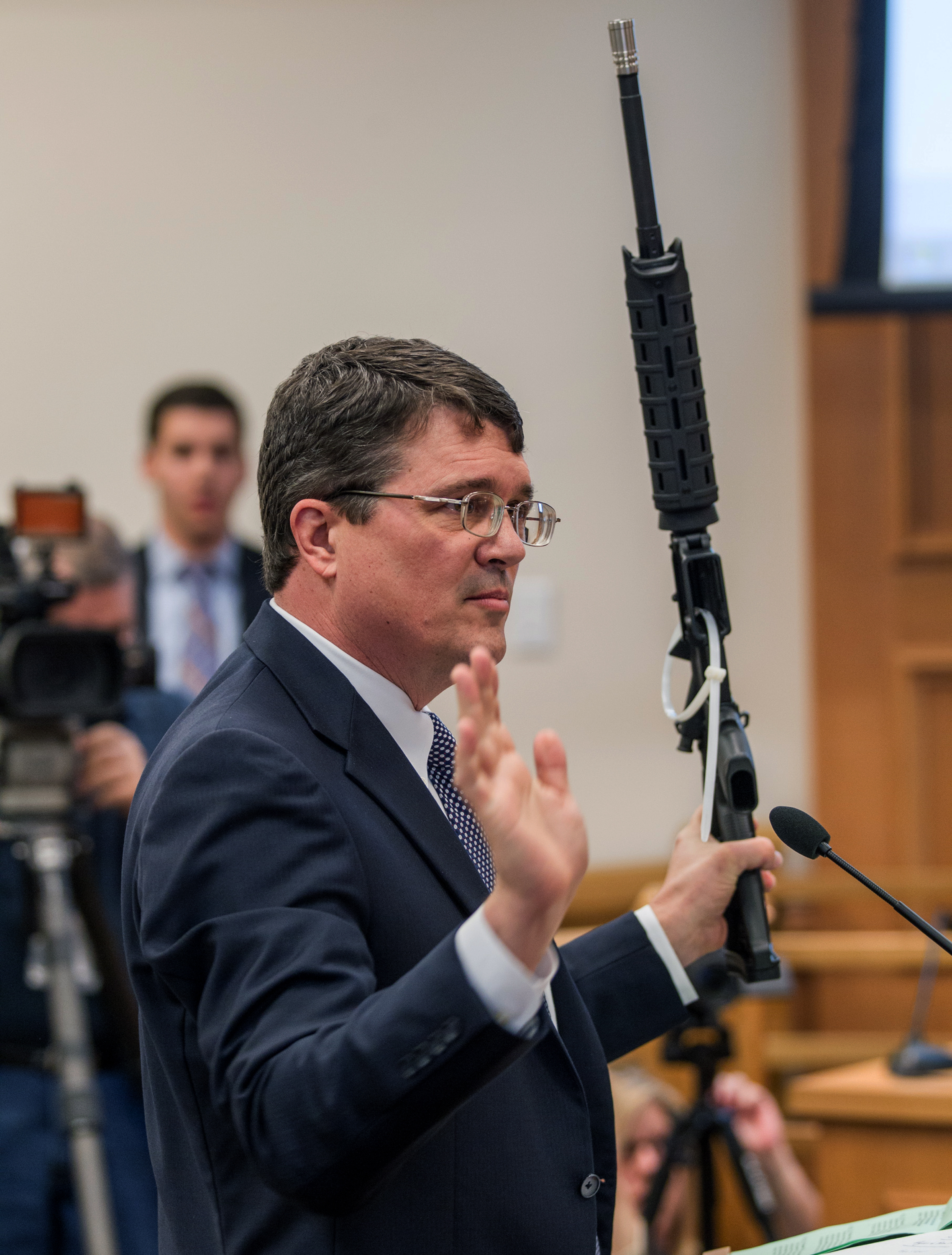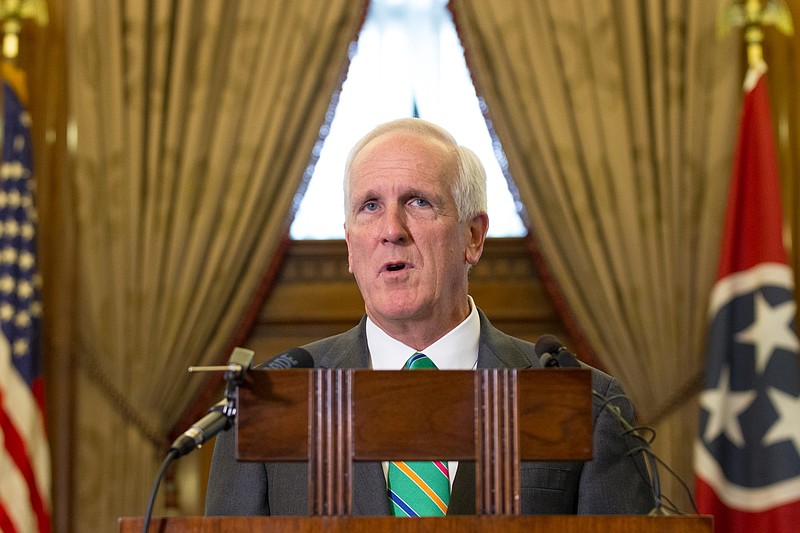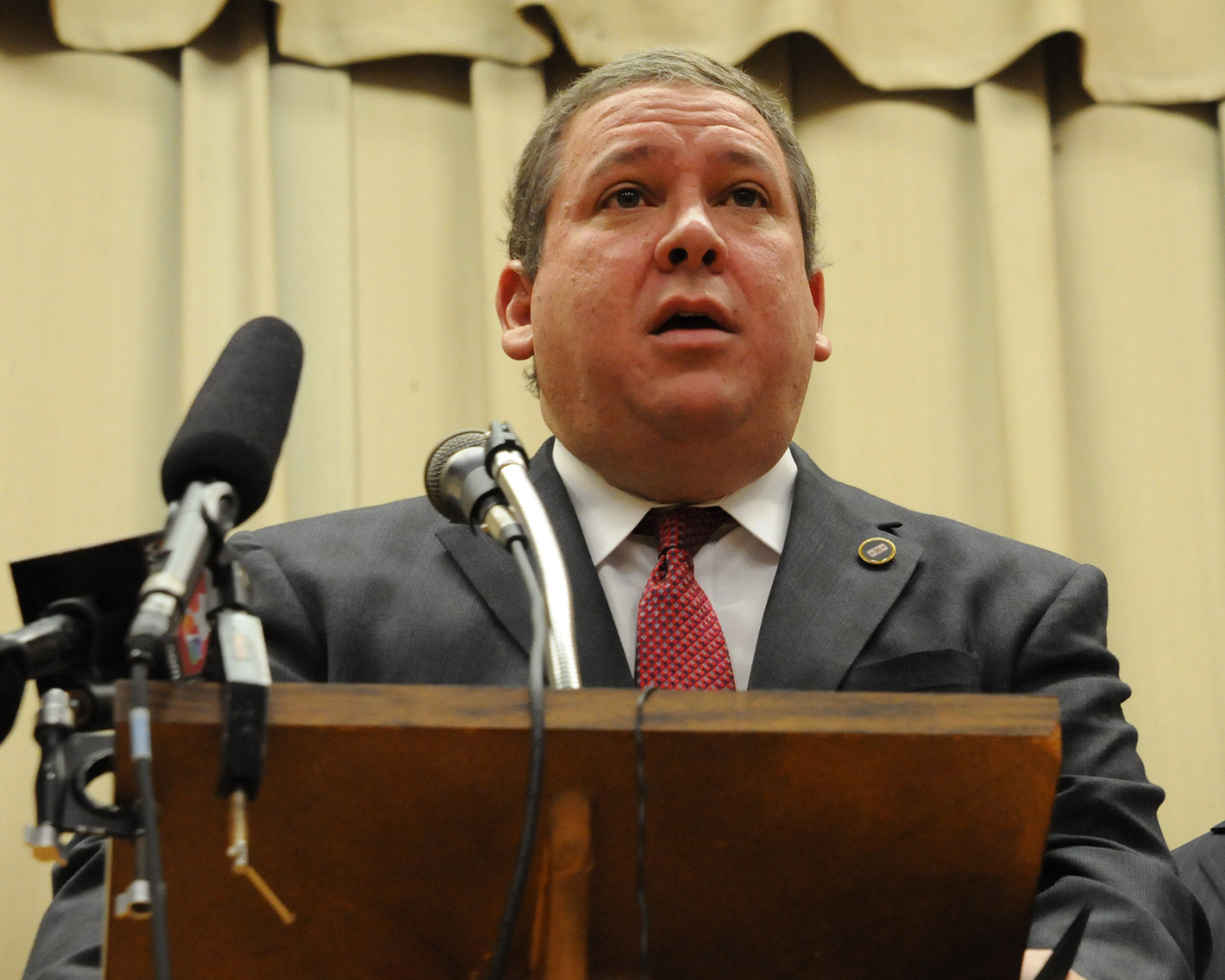 State Rep. Mike Stewart, D-Nashville, shows a gun he bought without a background check to the House Civil Justice subcommittee in Nashville, Tenn., on Wednesday, March 23, 2016. The committee later defeated Stewart’s bill seeking to require background checks for all gun purchases in Tennessee. (AP Photo/Erik Schelzig)
State Rep. Mike Stewart, D-Nashville, shows a gun he bought without a background check to the House Civil Justice subcommittee in Nashville, Tenn., on Wednesday, March 23, 2016. The committee later defeated Stewart’s bill seeking to require background checks for all gun purchases in Tennessee. (AP Photo/Erik Schelzig) NASHVILLE - Tennessee's public schools and colleges risk losing hundreds of millions of dollars in federal funding if a transgender bathroom bill becomes law, state Attorney General Herbert Slatery warned Monday.
Slatery's comments came as gay rights advocates sought to amp up pressure on Tennessee Republican lawmakers and the country music industry by calling Monday on major labels to demand bills targeting the lesbian, gay, bisexual and transgender community be scratched.
House Democratic Caucus Chairman Mike Stewart of Nashville said Slatery's opinion should serve as the "final nail in the coffin" of the transgender bathroom bill, sponsored by Sen. Mike Bell, R-Riceville, and Rep. Susan Lynn, R-Mt. Juliet.
Proponents say the concern is privacy protection.
Slatery said the bathroom bill, which would require students to use bathrooms based on their gender at birth, risks being seen as violating the federal Education Amendments of 1972 if "the U.S. Department of Education, which is charged with enforcing Title IX, interprets Title IX to require that transgender students be given access to restrooms and locker rooms consistent with their 'gender identity' instead of their anatomical gender."
He said federal officials' interpretation and the U.S. Department of Education have already challenged some school districts' implementations of policies mirroring the Tennessee bathroom bill.
Slatery also said if House Bill 2414 is enacted, a public school or college that "implements that law will be putting its Title IX funding at risk, because a recipient of federal funding that discriminates in violation of Title IX may lose its federal funding."
Republican Gov. Bill Haslam and state education officials have raised similar concerns. A legislative fiscal note says the loss to public schools and colleges could hit $1 billion or more if the Obama administration cracks down.
Bell said while he hasn't had time to study Slatery's opinion, he thinks there "have been a couple of federal court decisions already that were contrary to what he said. I think he's going along with what the Obama administration's Department of Education has put out in its guidelines."
State senators on late Monday afternoon gave final approval to another of the criticized bills. That measure would allow mental health counselors or therapists with "sincerely held principles" to refer to others or reject lesbian, gay, bisexual or transgender clients.
On Monday morning, the Tennessee Equality Project and GLAAD, formerly known as the Gay and Lesbian Alliance Against Defamation, held a news conference in Nashville on what they called discriminatory bills in the Legislature.
They said they believe the bills in Tennessee and other states are part of the political fallout from the right on the U.S. Supreme Court's decision that legalized same-sex marriage and triggered an avalanche of "religious liberty" legislation, primarily in Southern states.
Sarah Kate Ellis, GLAAD president and CEO, said 12 convention groups have already told Nashville officials they plan to cancel events in the Music City if the transgender and counseling bills become Tennessee law.
She called on label chiefs from Sony Music to Curb Records to follow the lead of the film industry, where threats helped spur Republican Georgia Gov. Nathan Deal to veto a "religious liberty" bill passed by lawmakers there.
"Gov. Deal did the right thing," Ellis said.
Noting that some country music artists like Emmylou Harris have already spoken out against the Tennessee legislation, Ellis said, "I'm here today to call on [music label heads] to stand beside the film industry."
Chris Carmack, an actor and singer who appears in the country music TV series "Nashville" as a gay character, warned the negative impact on Tennessee tourism and economic activity could prove devastating.
It "could take years to undo," Carmack said.
But he quickly added the transgender bathroom bill's damage to young LGBT students might never be repaired.
Also objecting was Desmond Child, a songwriter who has written top hits for Bon Jovi, Aerosmith, Alice Cooper, Carrie Underwood, Trisha Yearwood and Garth Brooks, as well as Ricky Martin's hit "Livin' La Vida Loca."
Child said he lives in Nashville with his husband and they have adopted twins. Calling Nashville "incredibly soulful," Child said he has met many deeply religious people at the church he attends and has been told by them that getting to know him and his family has "changed hearts."
He called the legislation "shocking and terrible dangerous and reckless," a result of right- wing attacks.
"This is about religious bigotry and hate," he charged.
Asked what he thought about the criticisms, Bell later said, "I'd say God help us if we start making decisions based on what celebrities think about it."
"Religious freedom" bills in several states have received pushback from major corporations and entertainers.
Last week, rock musician Bruce Springsteen canceled a concert in North Carolina over a newly passed transgender bathroom law.
While some country music artists have denounced the legislation, Ellis said there has been no large public outcry so far from recording industry chiefs in the Nashville-centered country music industry.
Several major corporations in Tennessee, including Alcoa, have denounced the bills, warning of devastating impact on their recruitment and attracting new investments.
Two top Republican leaders in the Tennessee General Assembly told the Times Free Press last week that threats of economic retaliation will have no impact on them.
"It is unfortunate that this issue even exists - but it does," said Senate Speaker Ron Ramsey, R-Blountville. "I support the bill. While I understand some in the business community have concerns, I do not share them."
He said Tennessee "has low taxes, little debt and one of the best regulatory environments in the nation. Whether this bill passes or doesn't, Tennessee will continue to be the best state in the union in which to own and operate a business."
House Majority Leader Gerald McCormick, R-Chattanooga, said that although he has not read the amended House version of the transgender bathroom bill, "just as a general subject matter, I think people, if they're a man, they ought to go to the men's room, and if they're a woman, they ought to go to the women's room. That's just how I feel about it. I'm not going to put guys in girls' bathrooms."
He added, "I know that's not fashionable and all the big companies from Silicon Valley don't like to hear people say that, and they're going to threaten us and bully us."
McCormick emphasized he has no personal bias against the LGBT community but feels strongly about the school bathroom issue.
Contact Andy Sher at asher@timesfreepress.com, 615-255-0550 or follow via twitter at Andy Sher1.


